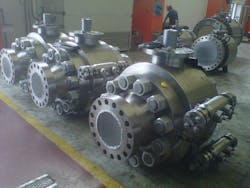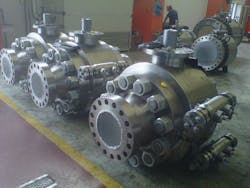Valve/instrumentation group diversifies into firefighting
Valvitalia is expanding its service to the upstream sector after acquiring Italy’s two main firefighting systems specialists, Silvani and Eusebi.
Since 2002, when Valvitalia was established in Rivanazzano Terme, south of Milan, the group has grown steadily following a series of acquisitions. Aside from most standard types of offshore valves, the company can offer a one-stop package that includes actuators, pig launching and receiving traps, flanges, pipe fittings, metering systems for measuring, filtering and regulating fluids and gases, and now firefighting systems, which also incorporate valves.
Today the group claims to be one of the five largest producers of valves and associated equipment worldwide, with turnover for 2015 projected at €500 million ($565 million) and 14 manufacturing plants worldwide.
“Offshore in particular has become a major market for us,” said Tony Ellis, Valvitalia’s vice president sales and marketing. “Many of our deliveries are for FPSOs, platforms, and subsea facilities. Our aim is to be as flexible and as all-inclusive as possible in what we offer, whether that means engineering equipment for high-pressure applications, in special materials or with special qualifications. We can provide additional testing in-house of high-pressure special products for production platforms, fixed and floating, or low-pressure testing for LNG applications.
“Valvitalia has a frame agreement with BP - currently it is supplying one of its new FPSOs in the North Sea and various facilities in the Gulf of Mexico - and another frame agreement with Statoil in Norway that takes in the Johan Sverdrup project, including the supply of high-pressure gate valves.”
Aside from cutting cost, increased safety is one of the industry’s current priorities. This means extended test criteria, particularly for corrosion properties to withstand sour service and to meet operators’ emissions targets. Valvitalia’s in-house test facilities include a climate room that can be used to test valves and actuators at very low to very high temperatures - from -70°C (-94°F) to +120°C (248°F).
Of the two latest companies acquired, Silvani’s range is more specifically targeted offshore, Ellis said. “They offer a highly engineered service based on the layout of the facility and available space. Their clients include BP, ConocoPhillips and ExxonMobil.”
All Valvitalia’s products for offshore use are manufactured in Italy, “so there is a close interface between the various plants,” Ellis pointed out.

